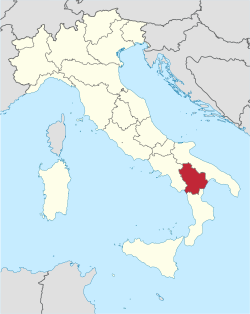
Back Basilikata ALS ባሲሊካታ Amharic Basilicata AN بزلكاتة Arabic Basilicata AST Bazilikata Azerbaijani باسیلیکاتا AZB Basilicata BAN Basilicata BCL Базіліката Byelorussian
Basilicata
Lucania | |
|---|---|
|
| |
 | |
| Coordinates: 40°30′N 16°00′E / 40.5°N 16°E | |
| Country | Italy |
| Capital | Potenza |
| Government | |
| • President | Vito Bardi (FI) |
| Area | |
• Total | 9,995 km2 (3,859 sq mi) |
| Population (3 October 2012) | |
• Total | 575,902 |
| • Density | 58/km2 (150/sq mi) |
| Demonym(s) | English: Lucanian Italian: lucano (m. sing.), lucani (m. pl.), lucana (f. sing.), lucane (f. pl.); basilicatese (sing.), basilicatesi (pl.) |
| GDP | |
| • Total | €13.022 billion (2021) |
| Time zone | UTC+1 (CET) |
| • Summer (DST) | UTC+2 (CEST) |
| ISO 3166 code | IT-77 |
| HDI (2021) | 0.865[2] very high · 17th of 21 |
| NUTS Region | ITF |
| Website | www |
Basilicata (UK: /bəˌsɪlɪˈkɑːtə/,[3] US: /-ˌzɪl-/;[4] Italian: [baziliˈkaːta]), also known by its ancient name Lucania (/luːˈkeɪniə/, US also /luːˈkɑːnjə/,[5][6] Italian: [luˈkaːnja]), is an administrative region in Southern Italy, bordering on Campania to the west, Apulia to the north and east, and Calabria to the south. It has two coastlines: a 30-km stretch on the Tyrrhenian Sea between Campania and Calabria, and a longer coastline along the Gulf of Taranto between Calabria and Apulia. The region can be thought of as the "arch" of the "boot" of Italy, with Calabria functioning as the "toe" and Apulia the "heel".
The region covers about 10,000 km2 (3,900 sq mi). In 2010, the population was slightly under 600,000. The regional capital is Potenza. The region comprises two provinces: Potenza and Matera.[7][8] Its inhabitants are generally known as Lucanians (Italian: lucani), and to a lesser extent as basilicatesi or by other very rare terms.[9]
In ancient times part of its territory belonged to Magna Graecia, subject to coastal Greek colonies (including Sybaris). Later the region was conquered by the ancient Romans. It was then conquered by the Byzantines, and then by the Normans around the year 1000 with the Hauteville family. Their presence explains the persistence of the Gallo-Italic linguistic enclaves of Basilicata. The area was later dominated by the Aragonese and by the Spanish. Subsequently, it became part of the Kingdom of the Two Sicilies, before annexation to the unified Kingdom of Italy (proclaimed in 1861) after the 1860 Expedition of the Thousand.
- ^ "Population on 1 January by age, sex and NUTS 2 region", www.ec.europa.eu
- ^ "Sub-national HDI – Area Database – Global Data Lab". hdi.globaldatalab.org. Retrieved 5 March 2023.
- ^ "Basilicata". Lexico UK English Dictionary. Oxford University Press. Archived from the original on 22 March 2020.
- ^ "Basilicata". The American Heritage Dictionary of the English Language (5th ed.). HarperCollins. Retrieved 6 May 2019.
- ^ "Basilicata". Merriam-Webster.com Dictionary. Merriam-Webster. Retrieved 6 May 2019.
- ^ "Lucania". Collins English Dictionary. HarperCollins. Retrieved 6 May 2019.
- ^ "Basilicata nell'Enciclopedia Treccani". www.treccani.it.
- ^ "lucano in Vocabolario – Treccani". www.treccani.it.
- ^ "Ci sono solo lucani in Basilicata?". Accademia della Crusca (in Italian). Retrieved 29 October 2021.

